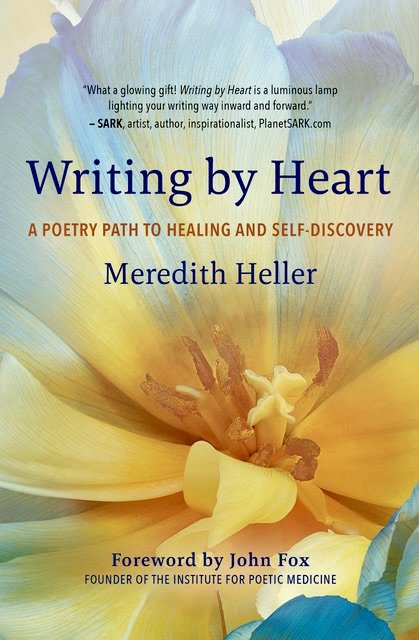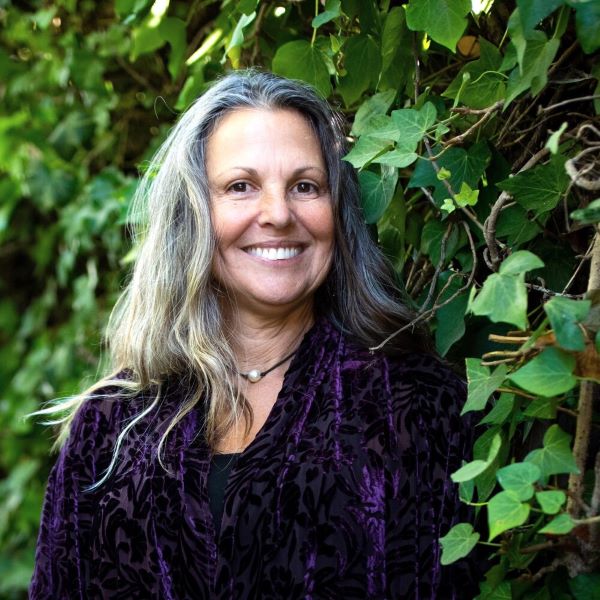 I love writing in community whether in a circle facilitated by me or at a workshop (which could be a writing retreat) with a respected mentor. Meredith Heller, who lives in Northern California, loves writing in community too. I can tell by the enthusiastic and engaging writing in her new book: Writing by Heart: A Poetry Path to Healing and Self-Discovery (New World Library, 2024).
I love writing in community whether in a circle facilitated by me or at a workshop (which could be a writing retreat) with a respected mentor. Meredith Heller, who lives in Northern California, loves writing in community too. I can tell by the enthusiastic and engaging writing in her new book: Writing by Heart: A Poetry Path to Healing and Self-Discovery (New World Library, 2024).
Meredith started “Writing by Heart” poetry workshops during the pandemic with some women from Marin County, California. Now, people from all over the world attend her workshops on Zoom. She has had the “honour and joy of guiding and supporting these amazing human beings as they write their way to the clarity and courage it takes to . . . . “ and here she notes the various challenges and transitions people take on. Meredith says: “They are able to access a source of wisdom that comes from their writing and from the support of the group.”
I definitely can relate to accessing wisdom which can happen when we take the time to write, an inviting space is created, and there are supportive writing companions and witnesses nearby.
In Writing By Heart, Merdith shares the techniques she developed to help people explore their emotions, find their voice and better navigate life’s challenges. She has many inspiring writing exercises, poems she has written, and the book also includes the poetry of her students. The poetry written by the workshop participants really helps to make the book feel as if you are part of a writing circle.
John Fox wrote the introduction to Writing by Heart and as he says he has dedicated his life to the healing power of poetry and poem making. I was very happy to meet John at a poetry retreat he was leading on Bowen Island, B.C. some years ago. I had read his books including Finding What You Didn’t Lose: Expressing Your Truth and Creativity through Poem-Making. John is the Founder of the Institute for Poetic Medicine and he invites readers to “plant your ‘heart broken open’ into this book, which was written to serve as a catalyst for your own poetic voice and creativity.”
As Meredith says in her own introduction: “Writing practice is about showing up and being present with yourself, however good or bad you feel.” She says in her first chapter, “Get Your Poetry Groove On,” that she uses the term poetry to encompass all forms of expressive writing.” Her workshops (Meredith has also been a Poet in the Schools for over twenty-five years) are geared toward generative writing so no editing is required. I’m thinking no critique is offered either so as to allow participants to really get to the heart of their writing without the fear of being judged.
She does offer a couple of suggestions to use more detail in one’s writing which she calls “fleshing it out.” Another technique is “boiling it down to the bones” which means cutting away the extras that aren’t absolutely needed. For instance, “I’m drinking mint tea” could become “mint tea” at the beginning of a poem.

The writing practices in the book begin with Body/Mindfulness, a guidance mediation in which to connect with your breath and “arrive” in the moment. The Body/Mindfulness sections are Meredith’s “special map to creativity” she says. “They provide a guided journey that helps you get out of your head, so you’re not writing solely from your thinking mind, but from deeper awareness, your senses, body feeling, imagination and deep psyche. In other words, it gets you in creative flow.”
Meredith was a bodyworker for twenty-seven years and the Body/Mindfulness meditations are a wonderful addition to the book. Author photo by Vaschelle Andre
Animal guides are used throughout as Meredith began working with them while studying shamanic journey work.
A chapter titled “Elemental Wisdom” invites people to write from each of the elements: Earth, Air, Fire, and Water. “Body Language” is another chapter in which Meredith doesn’t shy away from the private parts. Yes, there’s “Vagina Time!” and “Ode to the Tush.”
“Sensorium” is a good chapter to awaken all the senses. In the “Wild Heart” chapter, Meredith lists some categories of belonging and invites readers to write the words “I belong to . . . “ continuing from there. I like the invitation as well to write a “poet bio that expresses your wild she-heart.” Meredith says: “All the special things that make you who you are matter” are what make up your poetic bio. She must have had such fun writing this book and engaging others in her “Write Now!” invitations.
There’s also a chapter on “Belonging” with the intention of weaving “the abandoned parts of yourself back into belonging.”
In “Fertile Darkness,” Meredith includes examples of blackout poems. I’ve tried this with a page of a novel; it can be any piece of prose. The newspaper might work well! Circle the words you’d like to have for your blackout poem and black out the rest. “Trust the mystery. The poem knows the poem,” as Meredith says.
I appreciate Meredith’s chapter on “Desire” in which she says “For some of us desire is a compass pointing us home to what makes our heart hum.” She suggests we get in touch with “our inner child” so as to “access our original blueprint, what we came here to do.”
There may be a spirit animal to assist with tuning into your deeper instincts and Meredith’s Body/Mindfulness invitation offers some steps.
I read the book in order but you can jump in where you’d like to as chapters with the titles of “Zen Bones,” “Moon Dance,” and “Metamorphosis” may be enticing you to start there first.
“Write to digest your past, inhabit your present, and imagine your future,” Meredith says. “Write to compost what no longer serves you, and to bloom with renewed vitality as you embrace the inevitable ups and downs of your life.” All of the pages in Writing by Heart are inviting doors. If you open any one of them you can write on through.
